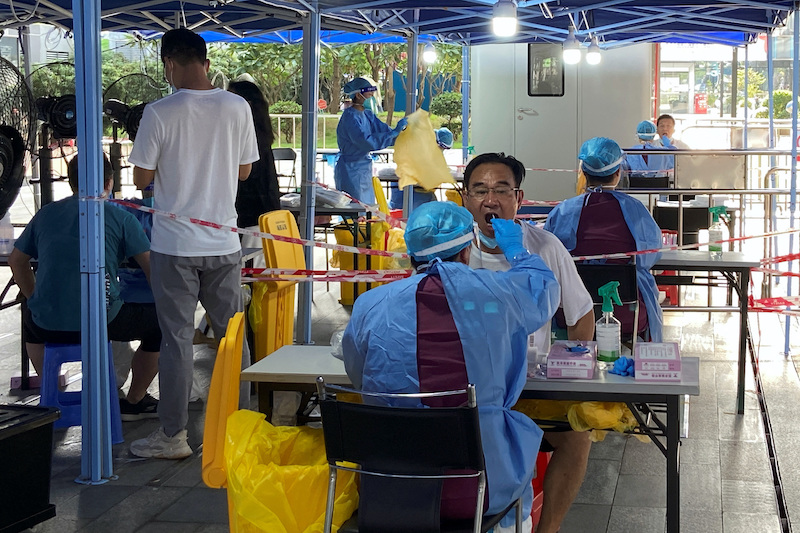Authorities in the Chinese tech hub of Shenzhen have brought in more Covid curbs as fresh outbreaks threaten the country’s stuttering recovery.
Parts of the southern city saw new restrictions imposed on Friday and in Chengdu, which put its 21 million people under lockdown on Thursday, factories including plants run by auto giants Toyota and Volkswagen were keeping production running under self-contained “closed-loop” operations.
Curbing the movements of tens of millions of people intensifies the challenge for China to cushion the economic impact of a “dynamic-zero” Covid policy that has kept its borders mostly shut to international visitors and made it an outlier as other countries learn to live with the coronavirus.
China has given little indication of any plans to pull back on its stringent controls.
Also on AF: China Property Bonds Being Shunned Over Default Danger
Economists at Nomura said in a Friday report that market expectations for easing once China’s ruling Communist Party completes a once-in-five-years Congress in October are optimistic.
Nomura expects Covid curbs to remain at least until March, when the annual parliamentary session takes place.
Even then “we expect the economy and markets to experience a difficult period, as people will be either disappointed about no real opening or be overwhelmed by a surging Covid infection,” the economists wrote.
The world’s second-biggest economy slowed sharply in the second quarter due to widespread lockdowns, and a nascent third-quarter recovery appears in danger of stalling due to the fresh Covid flare-ups.
“We believe markets still underestimate the severity of this round of [Covid],” Nomura wrote.
China’s blue-chip stocks sagged on Friday as in the Shenzhen business districts of Futian and Longhua, home to a major campus of Apple iPhone assembler Foxconn, restrictions were extended until Sunday, while residents in several areas across the city were asked to work from home if possible.
Shenzhen Records 87 Cases
Most of Shenzhen’s nearly 18 million residents are now under Covid controls.
In March, the city swiftly locked down for a week to fight community infections, but on Thursday evening, officials sought to quell rumours that another full lockdown was imminent.
They said people could leave and return to their homes with proof of a test result less than 24 hours old.
“We need to get the virus under control, we can’t just give up like some countries,” said a woman surnamed Tang volunteering to help food deliveries at a locked-down housing compound in Futian, Shenzhen’s hardest-hit district.
“But I don’t know when it will end, it’s really hurting businesses.”
On Friday, officials reported 87 new locally transmitted Covid infections in Shenzhen on September 1, up from 62 a day earlier. Eight of the new cases were outside quarantine areas.
Chengdu Employees Work From Home
In Chengdu, uncertainty remained over whether the lockdown would be lifted after daily mass testing ends on Sunday. The city reported 150 new local cases for September 1, compared with 157 a day earlier.
Non-essential employees in Chengdu were told to work from home, while manufacturers capable of managing on closed campuses were exempted from work-from-home requirements.
Toyota Motor’s Chengdu plant, which has an annual production capacity of 105,000 vehicles, was “operating normally”, and inside a closed loop at the request of the Sichuan province government, a company official told Reuters.
A Volkswagen plant in Chengdu that makes the Sagitar and Jetta models has been operating in a closed loop since Thursday, a VW China representative told Reuters.
However, Sweden’s Volvo Cars, majority owned by China’s Zhejiang Geely Holding Group, has shut its Chengdu plant, a company spokesperson said on Thursday.
- Reuters with additional editing by Sean O’Meara
Read more:
China’s Economy Stumbles as Property, Covid Struggles Rage
China’s Chengdu Locks Down 21m as Covid Fight Flares Again
Concern on Impact of Covid Curbs in China’s Big Business Hubs
























